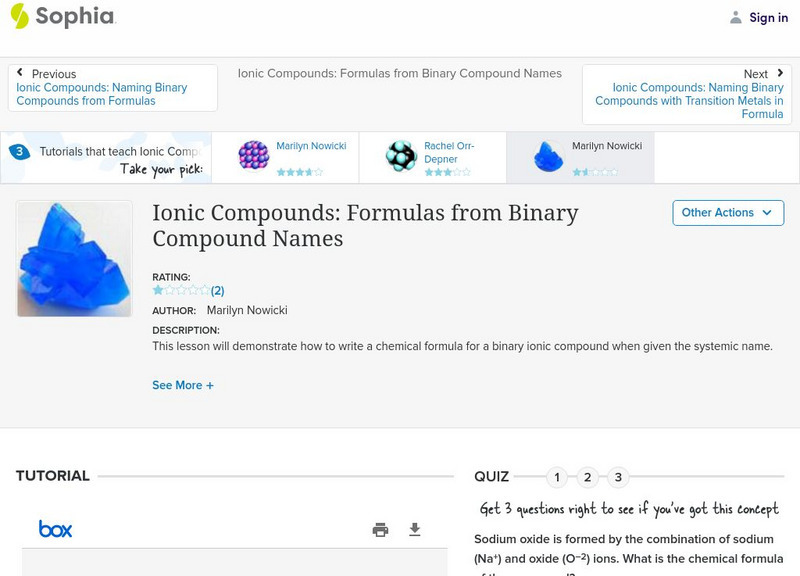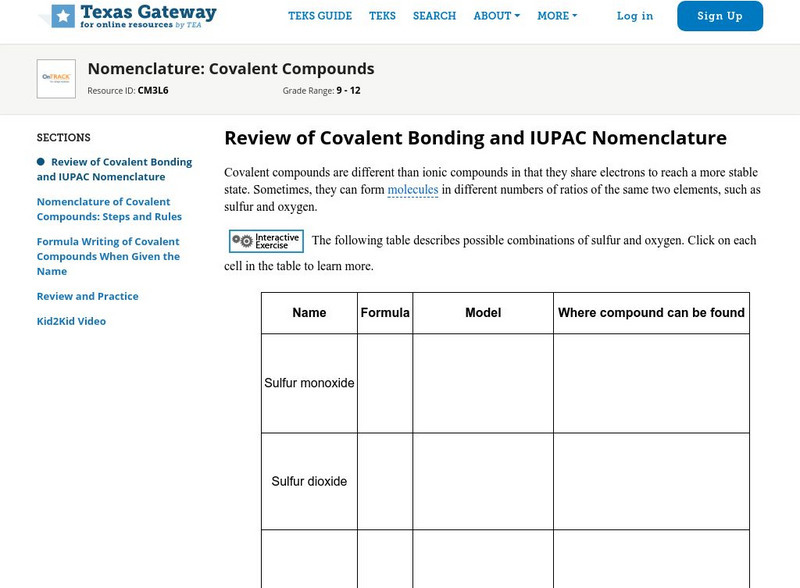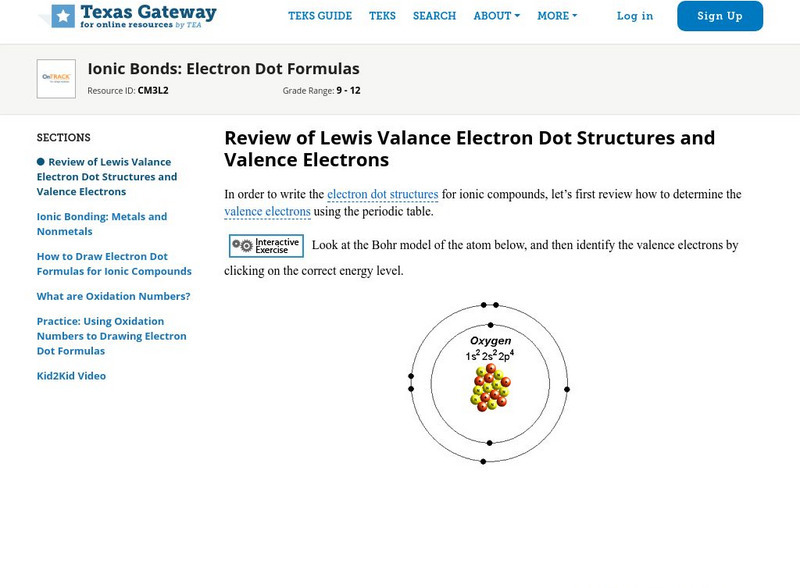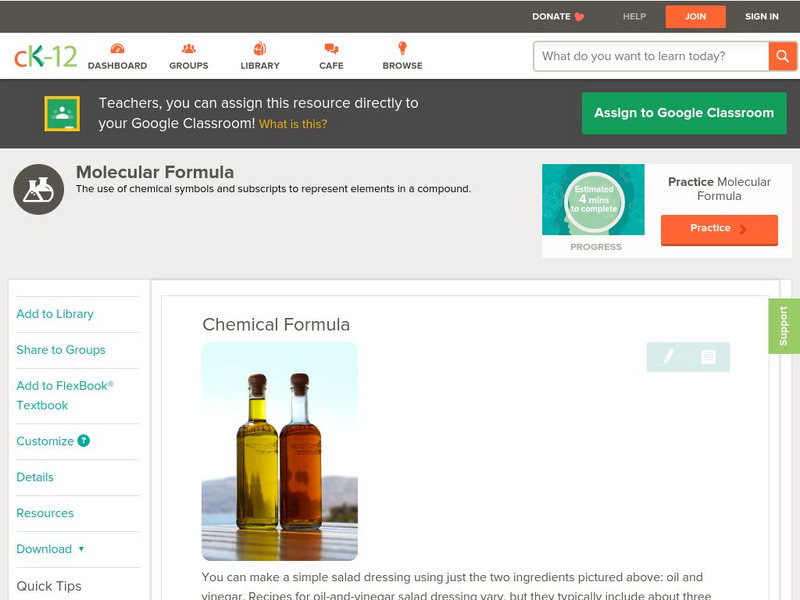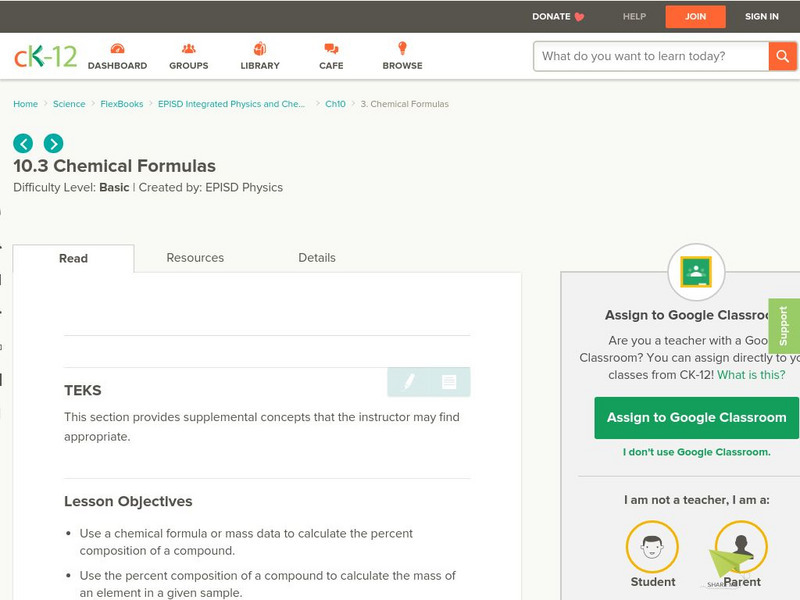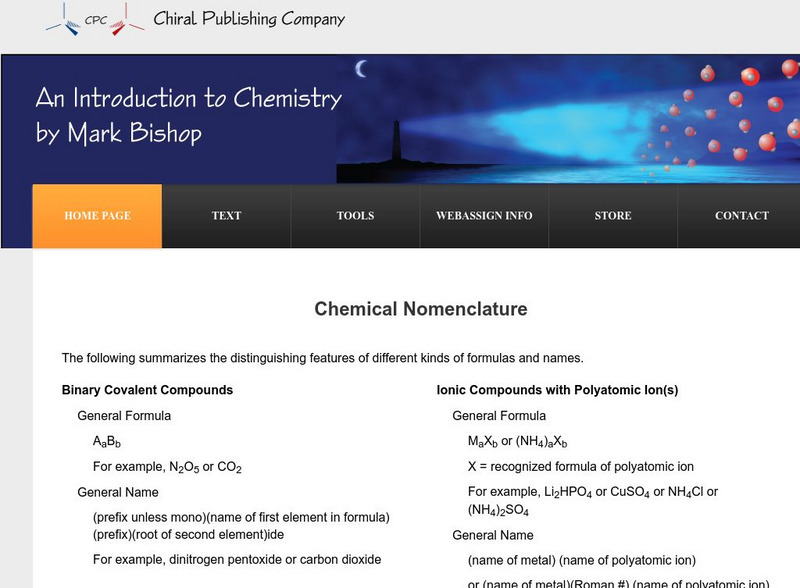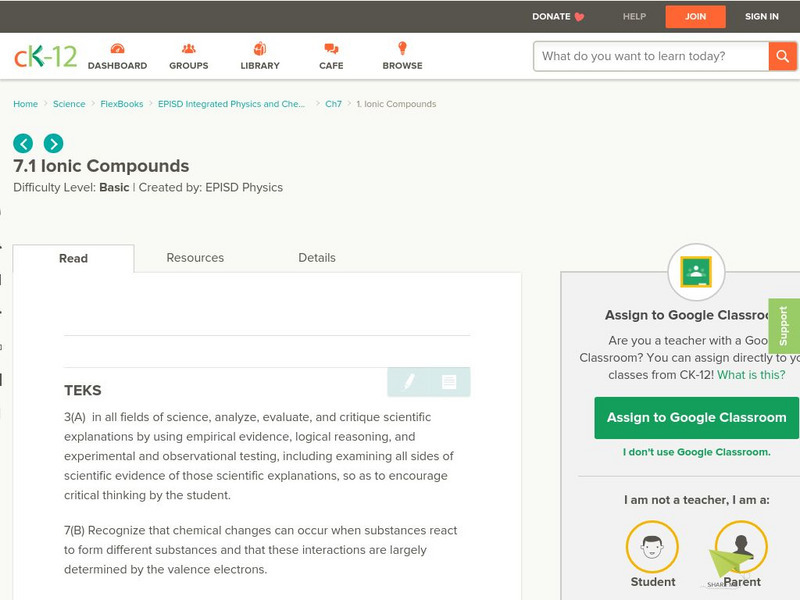Hi, what do you want to do?
Curated OER
Limiting Reagent
Students work in small groups with a small set of 8 nuts and 5 bolts to assemble into combinations of 1 nut: 1 bolt, and 2 nuts: 1 bolt. They explore the outcome and discuss. Then a student mixes two clear, colorless solutions together...
Curated OER
Ionic and Covalent Bonds
Ionic and covalent bonds are the focus of this chemistry activity, which provides students with eighteen key terms to use in a fill-in-the-blank activity. Additionally, students are prompted to write the number of atoms in four given...
Curated OER
Ions in the Environment
Learners explain the importance of the five main biogeochemical cycles. In this chemistry lesson, students discuss how ions are transported in the environment. They design an experiment to collect data on eutrophication.
Curated OER
You say Avocado, I say Avogadro
Students convert mole to mass to particles and vice versa. In this chemistry lesson, students discuss the importance of Avogadro's number. They apply what they have learned in a team competition.
Curated OER
Code Makers - Electron Configuration, Aufbau Principle
Students write the electron configuration of elements using the Aufbau principle. In this chemistry instructional activity, students build their own key that demonstrates the principle.
Other
Fernbank: Naming Chemical Compounds
Learn how to name chemical compounds. Scientist world over use a standard method for naming chemical compounds based on an international standard that makes working with chemicals not only precise but safe as well. Includes quiz.
Texas Instruments
Texas Instruments: Naming Chemical Compounds
This activity is designed to assess the comprehension of concepts related to naming chemical compounds.
Chiral Publishing
Chiral Publishing: An Introduction to Chemistry: Molar Mass and Chemical Compounds: Audio Book
Listen and watch as this audio book shows the relations of molar mass and chemical compounds. Discover the formula for molecular mass, ionic compounds, and formula units, and view several pictures about chemical formulas.
Texas Instruments
Texas Instruments: Naming Chemical Formulas
This Study Card stack will provide additional review for naming chemical compounds and chemical formulas.
Sophia Learning
Sophia: Ionic Compounds: Formulas From Binary Compound Names: Lesson 5
This lesson will demonstrate how to write a chemical formula for a binary ionic compound when given the systemic name. It is 5 of 5 in the series titled "Ionic Compounds: Formulas from Binary Compound Names."
eSchool Today
E School Today: Elements, Compounds, Substances and Mixtures
Learn about the classification of matter based on whether the chemical composition is pure or a mixture. Understand the definitions of elements, compounds, substances, and mixtures, and what the differences are between them. Five types...
Texas Education Agency
Texas Gateway: Nomenclature: Covalent Compounds
Given descriptions, diagrams, or scenarios, students will write and name the chemical formulas of binary covalent compounds.
Texas Education Agency
Texas Gateway: Ionic Bonds: Electron Dot Formulas
Given descriptions, diagrams, scenarios, or chemical symbols, students will model ionic bonds using electron dot formulas.
CK-12 Foundation
Ck 12: Physical Science: Chemical Formula
[Free Registration/Login may be required to access all resource tools.] How to write chemical formulae and what they represent about the substance.
Other
Science geek.net: Ions and Compound Formulas
A twenty-question multiple-choice exercise about chemical formulas. Quiz gives immediate feedback with the correct answer.
Mocomi & Anibrain Digital Technologies
Mocomi: Difference Between Elements and Compounds
Find out the difference between elements and compounds, the types of compounds, and how to write a compound formula.
CK-12 Foundation
Ck 12: Chemical Formulas
[Free Registration/Login may be required to access all resource tools.] Students will use a chemical formula or mass data to calculate the percent composition of a compound, and then calculate the empirical or molecular formula for a...
Chiral Publishing
Chiral Publishing: An Introduction to Chemistry: Chemical Nomenclature
Read and learn about the process in which compounds are named and written. View several examples of written compounds and have access to links that give more information about writing names and formulas for compounds.
CK-12 Foundation
Ck 12: Ionic Compounds
[Free Registration/Login may be required to access all resource tools.] Students investigate ionic compounds, and learn how to write chemical formulas for them.
Georgia Department of Education
Ga Virtual Learning: Chemistry: Chemical Formulas and Equations
In this interactive module, students are introduced to the most fundamental part of chemistry: chemical reactions and the formulas that accompany them.
Georgia Department of Education
Ga Virtual Learning: Physical Science: Bonding and Chemical Reactions
Through informational text, interactive puzzles, and review questions, students differentiate ionic and covalent bonds and identify the properties of each. They also use oxidation numbers to predict formulas of ionic compounds, name...
Crescent Public Schools
The Internet Science Room: Naming Chemical Formulas
Students can use this chemistry tutorial to help them understand how to name chemical formulas.
Crescent Public Schools
The Internet Science Room: Chemical Formulas
This illustrated tutorial serves as a foundation for understanding chemical formulas in chemistry.
Chem Tutor
Chem Tutor: Chemistry: Compounds
This lesson focuses on chemical compounds including Ionic and Covalent Bonds, Valences, Lewis Structures, Binary Covalent Compounds, Radicals or Polyatomic Ions, and much more. It also includes a compound worksheet in which the students...














